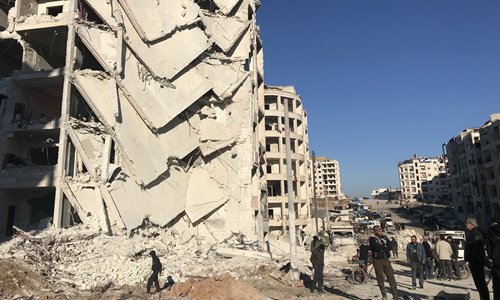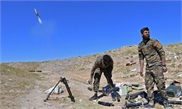Southern African bloc to send troops to insurgency-hit Mozambique
Fight against jihadists intensifies

People look at damage in the aftermath of an explosion that killed at least 23 people and injured tens more at a base for Asian jihadists in a rebel-held area of the northwestern Syrian city of Idlib on Monday. Photo: AFP
Southern African countries agreed to deploy forces to help quell a jihadist insurgency, as military and security sources said late Wednesday there had been fresh clashes with Islamist militants in northern Mozambique.
The Southern African Development Community (SADC) approved the deployment of the "SADC Standby Force in support of Mozambique to combat... terrorism and acts of violent extremism in Cabo Delgado," Executive Secretary Stergomena Tax said at the end of a one-day summit.
She gave no details of the strength of the force or how long it would be deployed.
As the leaders met, security and military sources said clashes had broken out in Palma district, near the multi million dollar Afungi LNG gas site.
The insurgents were repelled with air support, the security source said, but one helicopter that was trying to deploy troops had to make an emergency landing because of technical problems. There was no indication of casualties.
"Palma has been under attack since June 21," said the military source, based in the nearby town, without giving further details.
A leaked SADC document earlier in 2021 recommended sending around 3,000 soldiers to Cabo Delgado province, where insurgents have seized control of towns and villages, forcing hundreds of thousands to flee their homes.
Mozambique President Filipe Nyusi, himself a former defense minister, had for long shied away from asking for foreign military intervention to fight the jihadists.
His government's poorly trained and under-resourced security forces have relied on private military companies.
In a speech Wednesday, Nyusi thanked his counterparts for the support to "eradicate terrorism and violent extremism" in Cabo Delgado, saying it will complement the efforts of Mozambican forces. Nyusi, who chaired the bloc for the past 12 months before handing over to Malawi, had come under tremendous pressure from the SADC to deploy the force, said analyst Willem Els of the Pretoria-based Institute for Security Studies. For the bloc, "the situation in Mozambique is not only a local situation, it also evolved into a regional dilemma," he said.
Dino Mahtani of the International Crisis Group recently urged Nyusi to accept "measured" external intervention to avoid a "heavy deployment."
On Wednesday, he hailed the SADC decision as "an incremental step" in a long series of negotiations.
The violence has escalated in the gas-rich north of Mozambique since breaking out in late 2017 and there are fears that it could spill over into neighboring countries.
On March 24, Islamic State-linked militants launched coordinated attacks on Palma, ransacking buildings and murdering residents as thousands fled into the surrounding forests. The assault marked an intensification of violence that has driven around 800,000 people from their homes, according to the United Nations, and claimed the lives of more than 2,800 people - half of them civilians.
Following the March attack, French oil giant Total pulled out from a gas exploration site in the region.

